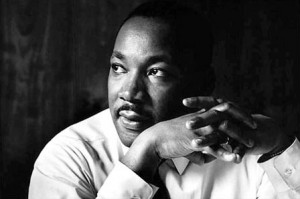 Thirty five years ago, President Reagan signed legislation a law to create a national holiday honoring slain civil rights leader Martin Luther King, Jr. On the occasion of creating this holiday, Reagan gave one of his most unifying and uplifting speeches, chronicling some of King’s achievements, starting with the Montgomery Bus Boycott that was inspired by Rosa Parks.
Thirty five years ago, President Reagan signed legislation a law to create a national holiday honoring slain civil rights leader Martin Luther King, Jr. On the occasion of creating this holiday, Reagan gave one of his most unifying and uplifting speeches, chronicling some of King’s achievements, starting with the Montgomery Bus Boycott that was inspired by Rosa Parks.
During King’s time leading the boycott, he developed new and innovative strategies of protest that changed the hearts and minds of a nation. By harnessing black Christian churches, professing Ghandi’s principles of non-violence, and using the visual power of television and print media, he gained support from all corners of the country.
King harnessed the power of biblical passages at a time when the average American was familiar with the Bible. His epic line from the I Have a Dream speech “until justice rolls down like water and righteousness like a mighty stream” was inspired by a passage from the Book of Amos, for example.
Look at the photographs of King protests. King’s men wore dress shirts and ties. The women wore dresses – even as they were blasted with fire hoses, arrested, and dragged to the police car. The images transmitted to the nation were compelling, and forced Americans to decide – will I stand with these people, or the angry mob?
While we know how the story ended, the people in the movement did not have the benefit of hindsight, and they risked it all to stand for justice and righteousness.
As Reagan remarked in his 1983 speech creating the holiday, “in a nation that proclaimed liberty and justice for all, too many Americans were living with neither.” Thanks to the selfless and courageous work of King and the millions of Americans that he inspired in the 1950s and 1960s, we have turned a page to strive to recognize the full measure of “liberty and justice for all” for every American.
